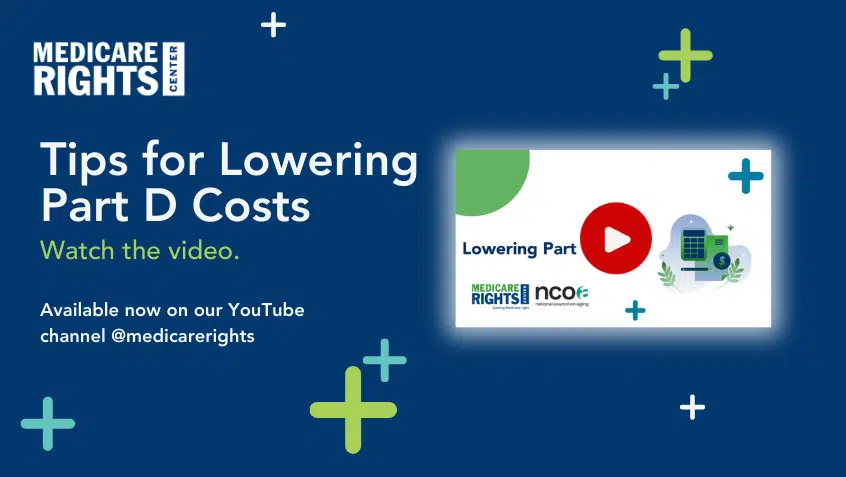Join Us Live for a Discussion on Medicare, Democracy, and the Future of Health Care
Medicare Rights Joins Legal Fight in Defense of Drug Price Negotiation

Last week, the Medicare Rights Center joined with other advocacy organizations to urge a federal court to reject claims by AstraZeneca—a major pharmaceutical company—that the Medicare drug price negotiation is unconstitutional.
The Inflation Reduction Act (IRA) created a new program to allow the Department of Health and Human Services (HHS) to negotiate prices for some of the costliest drugs taken by people with Medicare. In early 2023, the nonpartisan Congressional Budget Office (CBO) estimated that negotiation will save billions of dollars for beneficiaries, taxpayers, and Medicare while improving beneficiary health outcomes and program solvency.
In August, HHS announced the 10 drugs that would be negotiated in the first wave. This list included the drug Farxiga, a diabetes medication distributed by AstraZeneca. In October, HHS announced that all of the manufacturers of the 10 drugs that were selected for negotiation had agreed to participate in the negotiation program.
But many of the selected pharmaceutical companies also filed lawsuits citing various objections to the law, including constitutional claims. All of these cases are in very early stages, but in one—Dayton Area Chamber of Commerce v. Becerra—a judge has denied the plaintiff’s request for a preliminary injunction and appeared unconvinced that the constitutional claims had merit.
AstraZeneca’s lawsuit claims that the negotiation program denies the company due process under the Fifth Amendment because it requires manufacturers to negotiate prices and also flags the detrimental effects the program will have on innovation and access to cutting-edge medications.
Medicare Rights joined AARP, the AARP Foundation, the Center for Medicare Advocacy, and Justice in Aging in filing an amicus brief urging the court to deny AstraZeneca’s claims. The term “amicus brief” reflects that none of our organizations are either plaintiffs or defendants in the lawsuit, but we are strongly supportive of the defendants and wished to ensure the court heard our information in support of the defendants’ position.
The amicus brief points out the many ways that people with Medicare are harmed by high and rising drug costs, how other sectors of the health care system are already subject to Medicare’s negotiating power, and how drug price negotiation will benefit both Medicare and its beneficiaries.
At Medicare Rights, we understand this program is urgently needed, as people with Medicare are uniquely impacted by high and rising drug prices. This is partly due to utilization: Over two-thirds of beneficiaries have multiple chronic conditions and Part D enrollees take four to five prescriptions per month, on average. Many also live on fixed or limited incomes that make it difficult to keep pace with ever-escalating prescription drug costs. Half of all beneficiaries, nearly 30 million people, live on $29,650 or less per year and one quarter have less than $8,500 in savings. Health care expenses comprise a large and disproportionate share of their limited budgets. Nearly 30% of Medicare households spend 20% or more of their household spending on health care, compared to 6% of non-Medicare households. Out-of-pocket costs for prescription drugs represent a significant share of this amount, accounting for nearly one out of every five beneficiary health care dollars. In 2021, nearly 20% of older adults said they had not filled a prescription in the past two years; unaffordability was the main reason why.
Yet, drug costs continue to climb. Price hikes on brand name medications have exceeded the rate of inflation every year since at least 2006. In 2020, prices rose faster than inflation for half of all Medicare-covered drugs, including for 23 of the 25 Part D drugs with the highest total program spending.
High drug prices usually translate into higher out-of-pocket costs, especially for consumers who pay coinsurance, as most Medicare Part D enrollees do. They are also passed along to Medicare and to the taxpayers who help fund the program, and to all beneficiaries in the form of higher deductibles and premiums.
We are convinced that AstraZeneca and other pharmaceutical plaintiffs do not have sound legal arguments against the IRA’s negotiation program and are hopeful that none of the relevant lawsuits will disrupt these efforts to bring down drug prices for people with Medicare.
As the amicus brief states, “The IRA’s Negotiation Program is a monumental step forward that will help millions of older people access affordable medication and protect the financial security of Medicare. Any effort to end or weaken the Negotiation Program will only compound the harm the law is meant to prevent. Plaintiffs seek to protect the pharmaceutical industry’s ability to charge unlimited prices regardless of the harm that imposes to the health and, in some cases, the survival of older people with chronic conditions. Plaintiffs’ legal challenge threatens the financial health of Medicare. It is essential that the Negotiation Program be upheld and implemented.”
Show Comments
We welcome thoughtful, respectful discussion on our website. To maintain a safe and constructive environment, comments that include profanity or violent, threatening language will be hidden. We may ban commentors who repeatedly cross these guidelines.
Help Us Protect & Strengthen Medicare
Donate today and make a lasting impact
More than 67 million people rely on Medicare—but many still face barriers to the care they need. With your support, we provide free, unbiased help to people navigating Medicare and work across the country with federal and state advocates to protect Medicare’s future and address the needs of those it serves.
The Latest
Most Read
Add Medicare to Your Inbox
Sign up to receive Medicare news, policy developments, and other useful updates from the Medicare Rights.
View this profile on InstagramMedicare Rights Center (@medicarerights) • Instagram photos and videos









